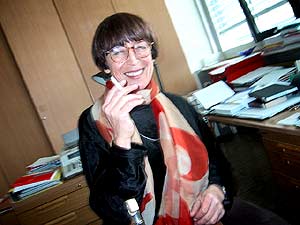From Creation to Creativity.
The Human Condition and the Order of Being in the Age of Biotechnology
By Elisabeth List
(University of Graz Austria)
Contribution for:
September 7-12, 2002, St. Petersburg, Russia
The Fifth International Congress on Philosophy and Culture
CREATION – CREATIVITY – REPRODUCTIONS:
WISDOM OF CREATOR, REASON OF DEDALUS AND THE CUNNING OF THE HACKER
One of the most crucial changes of
paradigm in contemporary understanding of culture and of the place of the human being in
the process of cultural and cosmic evolution is marked by recent developments in
biotechnology. Biotechnology today in its most extravagant presentations claims to
initiate an age of a “second creation” because biotechnology today seems to be
able to re-create living forms and even the human species according to new standards of
perfection and effectivity. A news era of “post-biologcal evolution” is being
proclaimed.
The cultural meaning and consequence of
this paradigm shift amounts to the abolition of the traditional order of being which was,
especially in the realm of religious beliefs and thinking, an order created by a
transcendental creator, by God or “Mother Nature” herself.
 |
In the
context of modern science and technology the human being is no longer seen as the creature
of a divine creator as in a religious frame of thinking, but as a being with the capacity
and ability of self-creation. How to react to this proclaimed transformation of culture,
and first of all: How to understand it?
In the face of a number of problematic
and even dangerous consequences of the recent revolutions in technology one might propose
to re-enforce or re-establish a safe religious order of being. From a philosophical point
of view however the first step would be to rethink what it means to be a creature without
presupposing the existence of a god. This would require developing a new framework of a
philosophical anthropology that shows and explains how the genuine human faculties and
properties could have evolved from the natural givens of human existence. |
The American philosopher
Susanne Langer was one of the thinkers in the last century who succeeded to provide such
an approach to the understanding of the human being. In her writings (esp. Mind. An essay
of human feeling, Baltimore and London: Hopkins University Press, 3 Vol. 1967-82) she
demonstrates how human mind evolves from a natural need to create symbols and how this
peculiar human capacity of symbolising enables humans to create language, myths, religious
and cultural forms like art.
As a creature the human being is to be
understood as the offspring of an autopoietic process of an “evolution
creatrice” (Henri Bergson), that means, in first place not as the creature of
somebody else, but as the heir of an open potential of evolving creativity, just as argued
by recent research on processes of autopoietic complexity in the process of life. To
resituate the human in the order of being it is necessary to refuse the mistaken claims of
omnipotence of recent biotechnology, which reduces the richness of the human potential,
the potential of life in general to a subtle mechanism.
In the face of the paradigm shift that brought about
technological efforts to produce “Artificial Life” it is of crucial importance
to bring into consideration the open potential of creativity of the living and of human
living. Nevertheless the human is not in a position completely to master it own conditions
of living, but is embodied in a larger context of living forms, that as a whole still lies
beyond human capacities of understanding and control. This might invite arguments for the
existence of God, but not as a matter of logical consequence. What is at place anyway is a
high level of scientific insight in the process of natural and cultural evolution but also
a new self-conscious attitude in the face of the inherent limits of modern science and
technology.
This is however not the leading opinion
of the day. Today the promises of revolutionary success, progress and profit of the new
biotechnologies dominate the stock markets, university seminars and political debates. The
21st century has been proclaimed as the century of the biotechnologies.
A number of key issues must be addressed
before we can think about the effects of biotechnology on both “the order of
being” and of “human condition”: 1) the development of biology as life
science in the 20th century, 2) the role of science in modernity in general, 3) the
relations between science, technology and industry, the character and impact of
biotechnogies and 4) the special role of biotechnologies of body and self for human
self-understanding. [...]
[this is only a
shortcut. download the full text as rtf-file: 49 kb]
[Core] [Reset]
[Home]
[Elisabeth List: Home] |